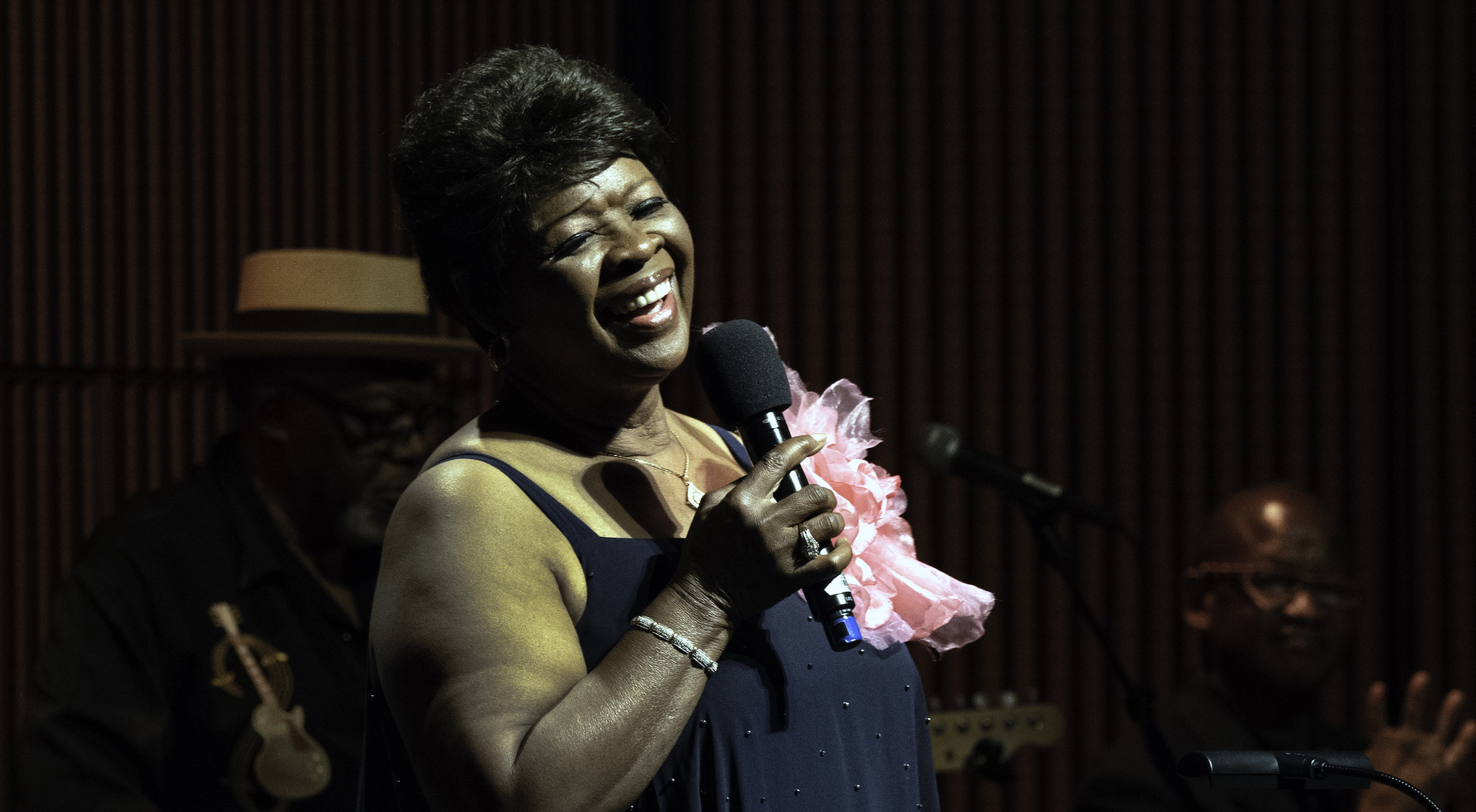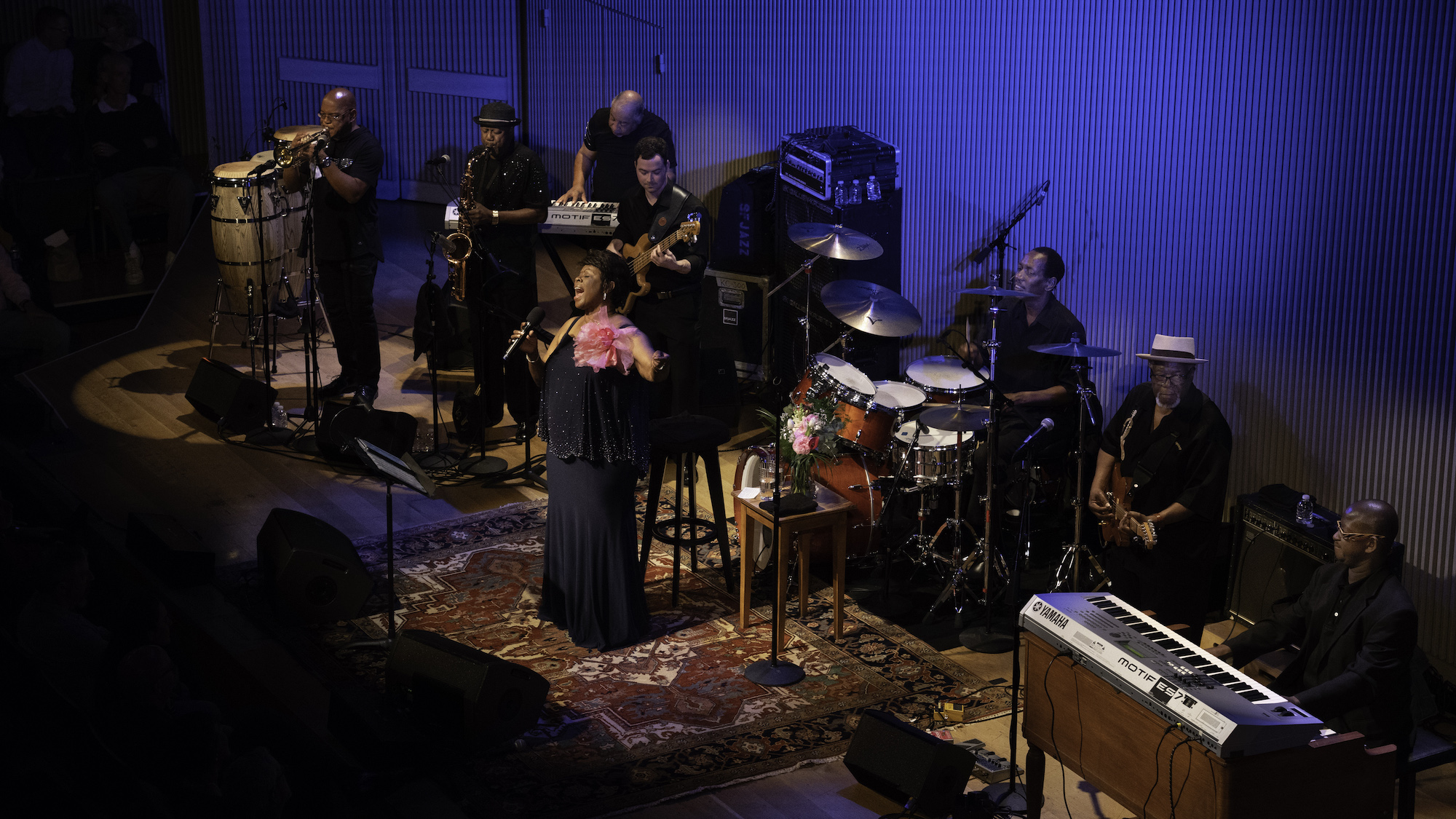August 01, 2024
Irma Thomas: Bringing Joy to the People
By Richard Scheinin
In August we welcome the Preservation Hall Jazz Band with a very special guest: the Soul Queen of New Orleans, Irma Thomas. Staff writer Richard Scheinin spoke to her about her monumental career.

Irma Thomas at SFJAZZ, 6/8/18 (photo by Richard Gelfand)
In 1964, when 23-year-old Irma Thomas released her single “Time Is on My Side,” a pair of R&B aficionados named Mick Jagger and Keith Richards went to see her perform in England. They loved her new song, they told her, and planned to record it — which they did, with Jagger mimicking Thomas’s ad-libbed “Go ahead, baby” mid-track rap. It became the Rolling Stones’ first top 10 hit in the U.S., and Thomas spent years explaining to audiences that the tune was “my song,” she says today, “not the Stones’.”
Sixty years later — on May 2, 2024 at the New Orleans Jazz and Heritage Festival — she performed it with the Stones for the first time, ever. “It was about time,” she says, with a chuckle, by phone from her home in New Orleans, where she has spent most of her life. “You talk about miracles? That was a miracle, because Mick Jagger is 80 and I’m 83 and who would think we’d live long enough for that to happen?”
Thomas, who will perform Aug. 15-18 with the Preservation Hall Jazz Band at SFJAZZ (also broadcast on Fridays Live and available on-demand the following week), adds this: “It was the first time I’d seen Mick since he and watcha-call-’em” — Richards — “came to that show of mine in England and told me they liked my tune.”
Six decades had passed, but Thomas never really needed the Stones.
She is among the most commanding singers of her generation, with a career that stretches back to the late ‘50s, when she recorded her first single, “You Can Have My Husband (But Please Don’t Mess with My Man).” Her voice is regal, intimate, gritty. It instantly calls a listener to attention: “That’s Irma Thomas.” And while she never had the chart-topping successes of contemporaries like Aretha Franklin and Gladys Knight, many of her fans would set her beside them in the Soul Pantheon.
The Soul Queen of New Orleans — her semi-official moniker since the late ‘80s — spent her early years in rural Ponchatoula, Louisiana. “My parents were working in the city, so I was living with my grandparents on the farm,” she explains. “And as I remember it, you were always singing. You sung in the field, you sung in school.” Her father — Percy Lee, a steel chipper — was a blues fan, while her grandparents, she recalls, “had a battery radio and it was only turned on on weekends. Country music is what I heard; that’s what was available. And evidently `Tennessee Waltz’ was a song that had an impact on me, because that was the song my teacher wanted me to sing in the play we did at school.”
In Ponchatoula and later in New Orleans, where she moved at age nine, church was life’s centerpiece. It’s where her sound emerged, naturally. She wasn’t singled out for solos: “Everything was sung in the group, a cappella; everything was sung as congregational hymns.” To this day, unless she’s on the road, she sings on Sundays in the choir of Nazareth Baptist Church — “I’m an alto” — and when she performs a gospel set at the annual festival in New Orleans, much of her repertoire comes from the Baptist hymnal.

Irma Thomas at SFJAZZ, 6/8/18 (photo by Richard Gelfand)
A teenage mother when she began to sing professionally, Thomas juggled her career with a troubled marriage. (She would later write one of her best-known songs about that relationship: “Wish Someone Would Care.”) Within a few years, Allen Toussaint, tour de force of the New Orleans scene, was composing tunes especially for her, including “It’s Raining” and “Ruler of My Heart,” which they recorded for the local Minit label. Rehearsals took place “at his mom’s house in her living room,” she says. “He’d be at the piano and there’d be all the other musicians he needed that day. There’d be Benny Spellman and Ernie K-Doe and some others. And Allen would be writing, and he’d be teaching us the songs, and we’d be learning. And the others, if they didn’t have the lead part, would be doing backup.”
She also describes the Dew Drop Inn, a popular venue in the Central City neighborhood and a hotbed for rhythm and blues: “It was the club to play if you were a local artist or had made something of yourself in the field. Remember these were segregated days… It was a black-owned club, owned by a fella named Frank Painia. And he also owned a hotel and there was a restaurant and a barber shop there, and they were all connected. And that club would be full. I remember working weekends there, three nights a week, with Allen and the house band, a three-piece group.”
In 1964, she signed with Imperial Records (famous for recording Fats Domino and other Crescent City stars) and released a single with an interesting pedigree. “Anyone Who Knows What Love Is (Will Understand)" was composed by a young Randy Newman and a country music newcomer named Jeannie Seely, then working as a secretary at Liberty. Thomas’s performance is among her best, haunting and straight from the heart. Time seems to stop as she declares:
You can blame me
Try to shame me
And still I’ll care for you
You can run around
Even put me down
Still I’ll be there for you
In the late ‘60s, she signed with Chess Records, then spent much of the 1970s in Los Angeles before returning to New Orleans where she has become a grande dame. (There’s even a statue of her on Bourbon Street, in New Orleans Musical Legends Park.) Thomas has 20 or more albums under her belt. She has toured widely as a leader and cherishes the memory of having sung with some of her father’s favorite blues musicians, including B.B. King and Lightnin’ Hopkins. “Those were full circle moments,” she says.
But she isn’t much of a networker, she concedes, and lives by her own terms. Asked for an example, she mentions this: “I choose not to commit to singing gospel in a nightclub where they’re up there with their liquor in their hand, shaking their tail-feather, and I don’t know whether they’re thinking about Jesus or their man. So I make that choice; I will not sing there. Because gospel music to me is not a show. It’s praise.”
She won a GRAMMY in 2007 for her album After the Rain and appeared on the HBO series Tremé. Around 2011, she noticed that audience members kept asking her to sing “Anyone Who Knows What Love Is (Will Understand)" — and discovered that they’d heard it on the soundtrack to Black Mirror, the dystopian, sci-fi TV series. “I was surprised to learn about that. And eventually the residuals started coming in, so it worked out fine for me and it showed that somebody’s listening. Another one of my tunes was on a commercial for Philadelphia brand cream cheese. `Take A Look’ (from 1966 and composed by Toussaint) was on that one.”
In 2022, PBS produced and broadcast a documentary about Thomas, Irma: My Life in Music. At 83, she’s very much on the map. She recently completed two new albums, one devoted to gospel, the other a collaboration with Galactic, the funk-jam-blues band from New Orleans. But she doesn’t know the release date for either: “I’m too busy being grandma,” she says. “At this stage of my life, I go out and sing when I feel like it — and that’s not too often! But when I do do it, I enjoy it.”
At her August shows with the Preservation Hall Jazz Band in San Francisco, she says, “We’ll be having as much fun as we can together, as a group… I have no clue what the repertory will be, but hopefully I can change the songs each night, because I don’t want it to be like Las Vegas where you get up and do the same exact thing every time. I’m not comfortable with that. I like to change it up. And I also like to converse with the audience. And the people who come, they often like to make requests, and I’m fine with that, even if it’s a song we haven’t rehearsed with the band. I’m happy to sing it a cappella, because I’m doing this for the people. They’re the ones who spent their money and took their time to come, and I want them to have some fun. For me, that’s the most important thing, bringing that joy to the people.”
The Preservation Hall Jazz Band with Irma Thomas perform 8/15-18. Tickets and more information are available here. The 8/16 concert will be broadcast live at sfjazz.org as part of the Fridays Live series, available on-demand 8/23.
A staff writer at SFJAZZ, Richard Scheinin is a lifelong journalist. He was the San Jose Mercury News' classical music and jazz critic for more than a decade and has profiled scores of public figures, from Ike Turner to Tony La Russa and the Dalai Lama.
